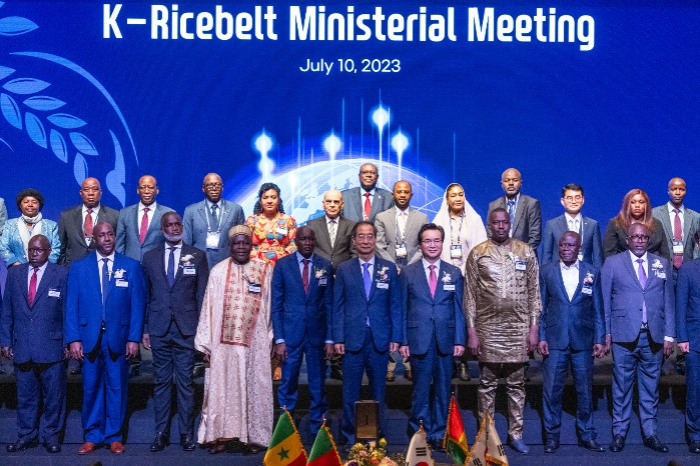Business & Politics
S.Korea to launch K-Ricebelt project in Africa
This official development assistance program seeks to make enough rice for 30 mn people a year
By Jul 11, 2023 (Gmt+09:00)
1
Min read
Most Read
LG Chem to sell water filter business to Glenwood PE for $692 million


Kyobo Life poised to buy Japan’s SBI Group-owned savings bank


KT&G eyes overseas M&A after rejecting activist fund's offer


StockX in merger talks with Naver’s online reseller Kream


Mirae Asset to be named Korea Post’s core real estate fund operator



South Korea has launched an official development assistance (ODA) project for a "K-Ricebelt" to produce rice for 30 million people every year in Africa.
This program seeks to alleviate food shortages on the continent by improving Tongil (Unification) rice, which saved South Korea from starvation in the past, to adjust to African climates and facilitate its supply there. This venture is expected to emerge as a major part of President Yoon Suk Yeol's strategy to expand the nation's ODA.
The Ministry of Agriculture, Food and Rural Affairs in Seoul on Monday at the JW Marriott Hotel Seoul declared the official launch of the project at a meeting of agricultural ministers from the eight participating African countries: Ghana, Gambia, Guinea, Senegal, Uganda, Cameroon, Kenya and Guinea-Bissau.
The project seeks to share South Korea's rice cultivation experience and supply varieties to the African countries. The ministry will cultivate the high-yield Isri 6 and 7, two improved types made by crossing Tongil rice with African counterparts, to produce seeds and distribute them to farmers.
The rice yield per hectare of both varieties is five to seven tons, or four times the 1.5 of African varieties.
The eight countries are large rice importers because their output of the staple food fails to meet demand. By 2027, the ministry will build rice production bases covering a combined 430,000 hectares in these states and if successful, the annual yield will reach an estimated two million tons, enough for 30 million people over a year.
The ministry said the project will not only advance African farming sectors such as agricultural machinery and fertilizer but also facilitate cooperation in supply chains of raw materials like crude oil and rare earth minerals.
"Africa is both the youngest continent and a treasure trove of resources," Minister Chung Hwang-keun said. “Starting with agriculture, we can expand cooperative ties to other fields."
Write to Jung-hwan Hwang at jung@hankyung.com
More to Read
Comment 0
LOG IN



